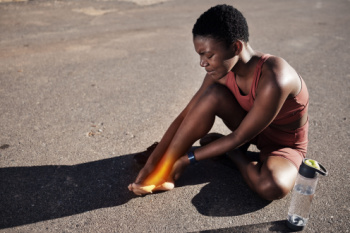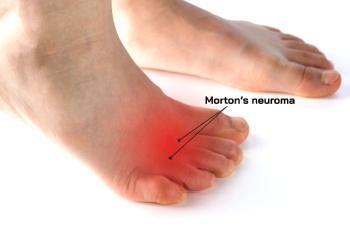
Feet work hard every day, so it is no surprise that they are prone to a variety of issues. Some of the most common foot problems include bunions, which cause a painful bump at the base of the big toe, and plantar fasciitis, a leading cause of heel pain. Flat feet, high arches, and hammertoes can also lead to discomfort and imbalance. Corns, calluses, and ingrown toenails are often caused by pressure or wearing poor-fitting shoes. Fungal infections like athlete’s foot or toenail fungus are also common, especially in damp environments. Overuse, aging, and medical conditions such as diabetes or arthritis can contribute to or worsen these issues. While some problems may improve with simple changes in footwear or home care, persistent pain or changes in the appearance of the feet should not be ignored, and it is suggested that you see a podiatrist.
Foot Pain
Foot pain can be extremely painful and debilitating. If you have a foot pain, consult with one of our podiatrists from North Penn Podiatry. Our doctors will assess your condition and provide you with quality foot and ankle treatment.
Causes
Foot pain is a very broad condition that could be caused by one or more ailments. The most common include:
- Bunions
- Hammertoes
- Plantar Fasciitis
- Bone Spurs
- Corns
- Tarsal Tunnel Syndrome
- Ingrown Toenails
- Arthritis (such as Gout, Rheumatoid, and Osteoarthritis)
- Flat Feet
- Injury (from stress fractures, broken toe, foot, ankle, Achilles tendon ruptures, and sprains)
- And more
Diagnosis
To figure out the cause of foot pain, podiatrists utilize several different methods. This can range from simple visual inspections and sensation tests to X-rays and MRI scans. Prior medical history, family medical history, and any recent physical traumatic events will all be taken into consideration for a proper diagnosis.
Treatment
Treatment depends upon the cause of the foot pain. Whether it is resting, staying off the foot, or having surgery; podiatrists have a number of treatment options available for foot pain.
If you have any questions, please feel free to contact our offices located in Lansdale, and King of Prussia, PA . We offer the newest diagnostic and treatment technologies for all your foot care needs.

When a bunion becomes very large and the front of the foot curves inward sharply, a condition called metatarsus adductus, walking can become painful and shoes may no longer fit comfortably. In more serious cases like this, a special type of surgery can help. Minimally invasive bunion surgery uses tiny cuts and small tools to realign the bones of the big toe and reduce the bump. This approach can also help correct the inward curve of the foot. Because the incisions are small, there is usually less swelling, less pain, and a shorter recovery time compared to traditional surgery. If you have a painful bunion along with a curved foot shape, it is suggested that you see a podiatrist to discuss if this surgical option is right for you.
Foot surgery is sometimes necessary to treat a foot ailment. To learn more, contact one of our podiatrists of North Penn Podiatry. Our doctors will assist you with all of your foot and ankle needs.
When Is Surgery Necessary?
Foot and ankle surgery is generally reserved for cases in which less invasive, conservative procedures have failed to alleviate the problem. Some of the cases in which surgery may be necessary include:
- Removing foot deformities like bunions and bone spurs
- Severe arthritis that has caused bone issues
- Cosmetic reconstruction
What Types of Surgery Are There?
The type of surgery you receive will depend on the nature of the problem you have. Some of the possible surgeries include:
- Bunionectomy for painful bunions
- Surgical fusion for realignment of bones
- Neuropathy decompression surgery to treat nerve damage
Benefits of Surgery
Although surgery is usually a last resort, it can provide more complete pain relief compared to non-surgical methods and may allow you to finally resume full activity.
Surgical techniques have also become increasingly sophisticated. Techniques like endoscopic surgery allow for smaller incisions and faster recovery times.
If you have any questions please feel free to contact our offices located in Lansdale, and King of Prussia, PA . We offer the newest diagnostic and treatment technologies for all your foot and ankle needs.

Pain in the ball of the foot, known as metatarsalgia, is a condition that affects many people. It often feels like a sharp, burning, or aching pain in the area between the arch and the toes. Common causes include wearing shoes that lack proper support or cushioning, high-impact activities that place excessive pressure on the forefoot, and foot deformities such as bunions or hammertoes. Other possible reasons for forefoot pain include nerve problems like Morton’s neuroma or thinning of the fat pad that cushions the bones in the ball of the foot. Without proper care, the pain may worsen over time and interfere with daily activities. If you are experiencing persistent pain in the ball of your foot, it is suggested you see a podiatrist for a proper diagnosis and treatment plan that can relieve discomfort and help prevent further complications.
Morton’s neuroma is a very uncomfortable condition to live with. If you think you have Morton’s neuroma, contact one of our podiatrists of North Penn Podiatry. Our doctors will attend to all of your foot care needs and answer any of your related questions.
Morton’s Neuroma
Morton's neuroma is a painful foot condition that commonly affects the areas between the second and third or third and fourth toe, although other areas of the foot are also susceptible. Morton’s neuroma is caused by an inflamed nerve in the foot that is being squeezed and aggravated by surrounding bones.
What Increases the Chances of Having Morton’s Neuroma?
- Ill-fitting high heels or shoes that add pressure to the toe or foot
- Jogging, running or any sport that involves constant impact to the foot
- Flat feet, bunions, and any other foot deformities
Morton’s neuroma is a very treatable condition. Orthotics and shoe inserts can often be used to alleviate the pain on the forefront of the feet. In more severe cases, corticosteroids can also be prescribed. In order to figure out the best treatment for your neuroma, it’s recommended to seek the care of a podiatrist who can diagnose your condition and provide different treatment options.
If you have any questions, please feel free to contact our offices located in Lansdale, and King of Prussia, PA . We offer the newest diagnostic and treatment technologies for all your foot care needs.

Onychomycosis is a fungal infection that affects the toenails, causing them to become thick, discolored, brittle, and sometimes painful. It often starts as a small white or yellow spot under the nail and can gradually spread, making the nail more difficult to treat over time. Warm, damp environments, like the inside of shoes, create the perfect conditions for fungi to thrive. Treatment for onychomycosis depends on how severe the infection is. Topical antifungal medications may work for mild cases, while more advanced infections often require oral antifungal medication or special procedures to effectively clear the fungus. In some cases, a podiatrist may need to remove part of the nail to treat the infection underneath. Early diagnosis and intervention improve the chances of successful treatment and prevent the infection from spreading to other nails. If you notice changes in your toenails, it is suggested that you schedule an appointment with a podiatrist for a proper diagnosis and personalized treatment plan.
If left untreated, toenail fungus may spread to other toenails, skin, or even fingernails. If you suspect you have toenail fungus it is important to seek treatment right away. For more information about treatment, contact one of our podiatrists of North Penn Podiatry. Our doctors can provide the care you need to keep you pain-free and on your feet.
Symptoms
- Warped or oddly shaped nails
- Yellowish nails
- Loose/separated nail
- Buildup of bits and pieces of nail fragments under the nail
- Brittle, broken, thickened nail
Treatment
If self-care strategies and over-the-counter medications does not help your fungus, your podiatrist may give you a prescription drug instead. Even if you find relief from your toenail fungus symptoms, you may experience a repeat infection in the future.
Prevention
In order to prevent getting toenail fungus in the future, you should always make sure to wash your feet with soap and water. After washing, it is important to dry your feet thoroughly especially in between the toes. When trimming your toenails, be sure to trim straight across instead of in a rounded shape. It is crucial not to cover up discolored nails with nail polish because that will prevent your nail from being able to “breathe”.
In some cases, surgical procedure may be needed to remove the toenail fungus. Consult with your podiatrist about the best treatment options for your case of toenail fungus.
If you have any questions, please feel free to contact our offices located in Lansdale, and King of Prussia, PA . We offer the newest diagnostic and treatment technologies for all your foot care needs.
